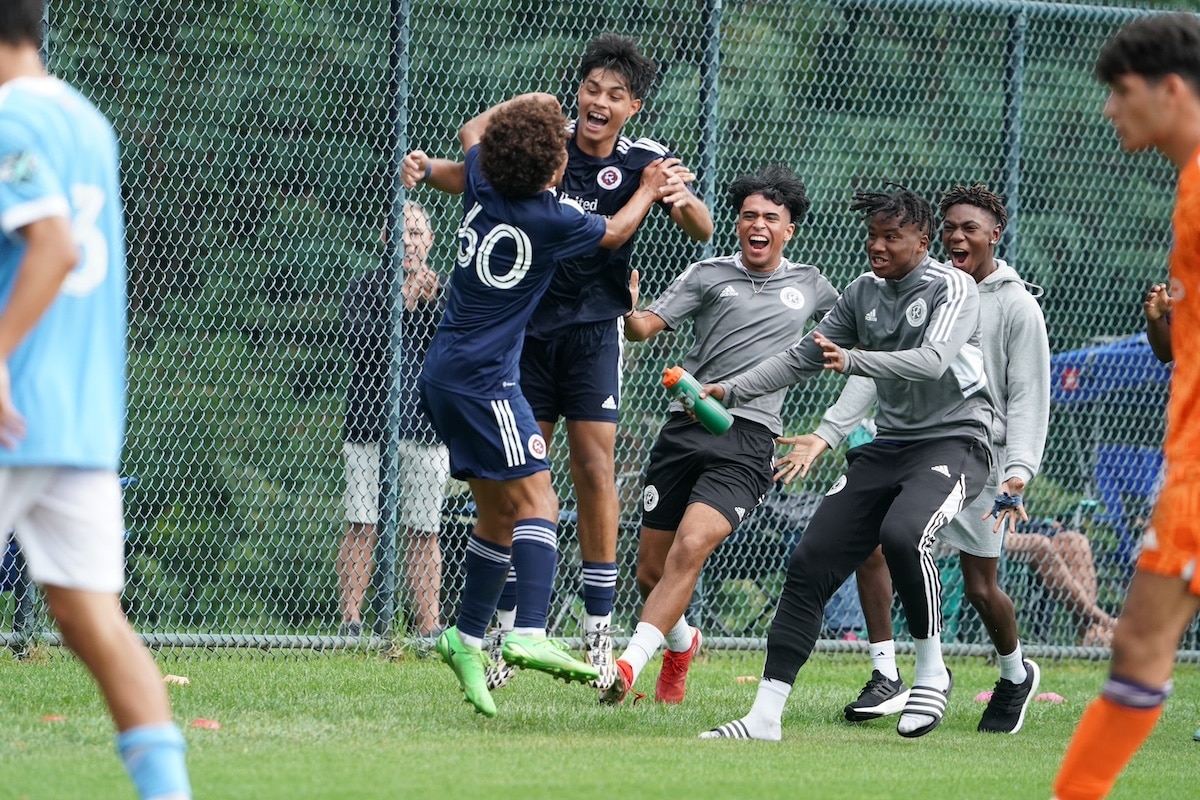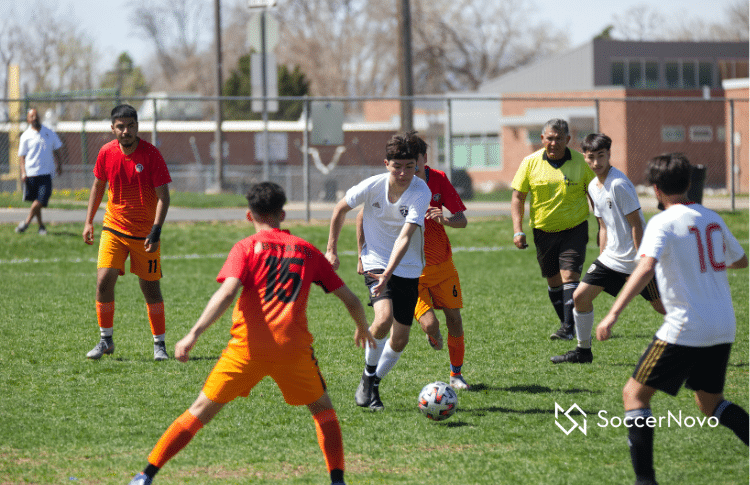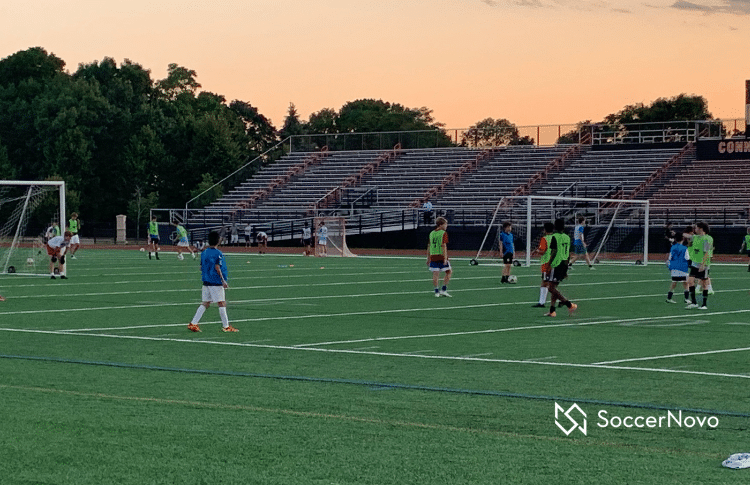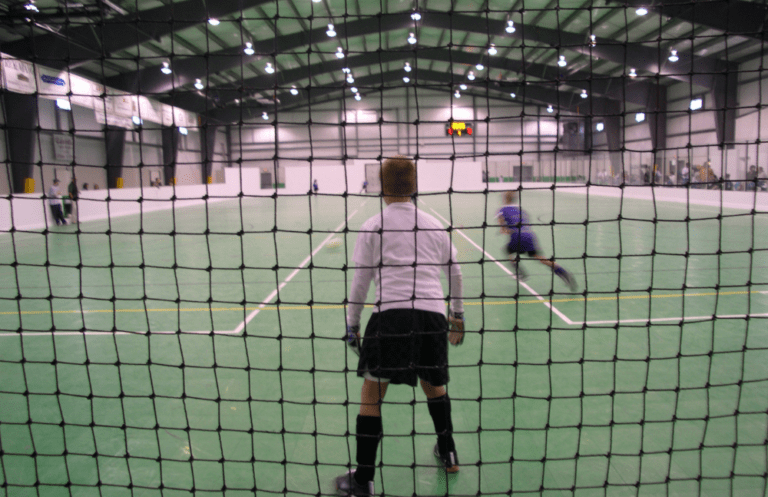Should I Play High School or Club Soccer?
Are you a soccer player (or parent of a player) trying to decide whether you should play high school soccer, club soccer, or both? You’ve come to the right place!
Key Takeaways From This Article:
- In most cases, it’s difficult to play both high school and club soccer because of the schedules.
- Some leagues like MLS NEXT will not allow players to participate in both.
- This is a personal decision and you’ll need to factor in your ultimate goal, whether you can join a club team after, and what’s potentially your academic goals.
It’s a common question among middle school and high school players in the U.S. It’s not so black and white and there are many factors to consider when making this decision.
Deciding Between HS & Club Soccer
High school soccer can be a fun and rewarding experience for many young players.
You get to play with your friends and classmates, and represent your school’s logo on the field.
High school soccer is played during the fall season, and the games are often held on weekday afternoons or evenings. This schedule allows you to balance your academics with your athletic pursuits, and it can be a great way to stay active and involved in your school!
I played for my high school and loved it. I loved practicing with my team, bantering during school, and just having my peers rally around me. I felt more confident walking down the halls knowing I had a good game. But, times are different…
Club soccer in the U.S. typically offers a higher level of competition and exposure to more college coaches.
Club teams typically play year-round, with games and tournaments held on weekends and trainings during the week. This can be a significant commitment, but it can also provide valuable opportunities to improve your skills and compete at a higher level.
Each decision depends on your unique situation so we’ll just lay out the entire landscape so you can make the best decision FOR YOU.
Differences Between High School and Club Soccer

When deciding whether to play high school or club soccer, it’s important to understand the differences between the two. Here are some key factors to consider:
Season Length
High school soccer typically has a shorter season, usually lasting a few months in the fall. By November schools will be looking forward to their winter programs.
Club soccer, on the other hand, can have a longer season that runs most of the year, with breaks for holidays and tournaments. This means that if you choose to play club soccer, you will have a longer period of time to develop your skills and improve your game. But, it also means you will be committed for the year.
There is a third option. To play high school soccer and then join a club team after but this sometimes doesn’t work out if that team already has a full roster.

Time Commitment
High school soccer often requires a significant time commitment. The time is condensed into three months so schools want to make the most out of it.
Club soccer can also be demanding with a few trainings per week and one or two games on the weekends. Additionally, there is more travel involved with club soccer. The parents bear the brunt of most of the travel.
Level of Play
High school soccer teams can vary widely in terms of skill level, as players are drawn from a specific geographic area and may have varying levels of experience.
On any team, there could be a big bench full of players from rec, travel, and club teams.
Club soccer, on the other hand, often attracts more dedicated and skilled players who are looking to play at a higher level. This can be a good option if you are looking to challenge yourself and improve your game.
More so on the boys side, the high school landscape has changed over the last decade and young players are finding it more challenging to play for their club rather than their high school.
This is mostly due to the loyalty from playing on the same club team in previous years.
Coaching and Training

High school soccer coaches are often teachers or volunteers who may not have extensive soccer experience. Some do, some don’t.
But, they should know the fundamentals to get by. They should at least run effective practices and set a good game strategy. They usually get a stipe-end for their time.
Club soccer, on the other hand, typically has more experienced coaches who can provide more specialized training and help players develop their skills. This can be especially beneficial if you are looking to play in college. The coaches are probably on a salary so the quality of their coaching is important.
Competition
High school soccer teams typically play against other schools in their area, while club soccer teams may travel to compete against teams from other regions or even other countries.
This can provide more varied and challenging competition for club soccer players.
Teams involved in MLS NEXT, Girls Academy, and ECNL will often compete against better teams than they would in high school.
Also, there is a huge difference between high school varsity, junior varsity, and freshman. The latter is much more competitive.
Cost
High school soccer is more affordable. It is usually funded by the school and doesn’t require players to pay fees.
If a player is attending a private high school for soccer, you can look at it as a cost to play soccer but you’re probably paying for an education.
Club soccer, on the other hand, can be more expensive, with fees for uniforms, equipment, travel, and tournaments.
Parents could be spending north of $5,000 each season. But, if you’ve made it this far, you probably realize how much club soccer in the U.S. costs already.
Note, many clubs offer scholarships or financial aid to help offset these costs.
Advantages of Playing High School Soccer

If you’re trying to decide between playing high school soccer or club soccer, there are several advantages to playing for your school team.
Having Pride in Playing for Your School
Playing for your high school team is a great way to represent your school and show your school spirit. It’s an opportunity to play with and against your classmates, and it can be a great way to make new friends and build relationships with your teammates.
Additionally, you’ll be put in an environment where you can showcase your skills and have friends cheering you on.
Team Camaraderie
Playing for your high school team can also help you develop a sense of team camaraderie.
You’ll be working together towards a common goal, and you’ll be able to share in the highs and lows of the season with your teammates.
You’ll get the recap of the practices, games, and season in the cafeteria. Or, hang out with a Senior when you’re a Freshman…
This can be a great way to build teamwork skills that will be valuable in other areas of your life.
Advantages of Playing Club Soccer

While high school soccer offers its own unique benefits, club soccer has some advantages that you may want to consider.
Year-Round Training and Competition
One of the biggest advantages of playing club soccer is that it offers year-round training and competition.
Unlike high school soccer, which is only played during the fall season, club soccer teams practice and compete throughout the year.
Playing year-round can help you maintain your competitive edge and give you an advantage over other players who only play during the high school season.
If you are a multi-sport athlete, finding the time to play club soccer and other sports can be challenging but it’s doable.
In addition to soccer, my son played basketball and flag football at different periods.
Higher Level of Play
The competition on the club soccer level tends to be higher than school ball. Leagues like MLS NEXT, Girls Academy, ECNL, etc. have elite players that have grown through the system and will stay until they graduate high school.
Club teams often attract the best players from multiple high schools, which means that you will be playing with and against some of the best soccer players in your area.
Also, the travel requirements allow for the best teams in the region to play each other. In high school sports, teams are traveling within their state or school districts. It’s a condensed area of competition in high school.
Exposure to More College Coaches

Club teams often participate in regional and national tournaments and showcases that are attended by many college coaches, which can increase your chances of being recruited.
Additionally, playing on a club team can help you get noticed by college coaches who may not have the opportunity to attend high school games.
Many club organizations have tight relationships with nearby colleges. This alone can help a player get recruited by DI, DII, and DIII colleges.
Specialized Coaching & Training
Finally, playing club soccer can give you access to specialized coaching that you may not get on a high school team.
Club teams often have coaches who specialize in specific areas of the game, such as goalkeeping or defending. This can help you improve your skills and become a more well-rounded player.
Can You Play Club and High School Soccer at the Same Time?
The short answer is not really.
Some soccer clubs won’t allow their players to play high school soccer because it takes away from the commitment.
This is also true on the other side…high school coaches don’t want their players to miss practices because they prioritize their club commitments.
Even more important, youth leagues like MLS NEXT do not allow players to play for their high school and their league unless there is a signed waiver.
In some of these cases, players will play for their school in the fall season and rejoin their club in after it ends. This is typically true on the girl’s side where some leagues will not have a fall season and resume afterwards.
Without knowing which club, league, and high school you attend, it’s difficult to provide a straight answer.
The best thing you can do as a player or parent is to look into the rules and possible exemptions of the club and high school. But, be cautious…sometimes they don’t play nice with each other.
Final Thoughts
Deciding whether to play high school or club soccer can be a very difficult decision. Ultimately, it comes down to your personal goals and aspirations.
Both options have their advantages and disadvantages, and it’s up to you to weigh them and make the best decision for yourself.
The decision to play high school or club soccer is a personal one. There is no right or wrong answer.
Consider your goals, financial situation, schedule, and priorities. From here, make the decision that is best for you.
Whatever decision you land on, do your best to maximize your opportunities! These are the formative years if you plan on playing at the next level.

Written By: SoccerNovo
SoccerNovo is an independent youth soccer media brand built to help parents, players, and coaches better understand the game and the pathways available in U.S. soccer. Our mission is to make youth soccer simpler, clearer, and more accessible for everyone involved in it.
Let’s connect







